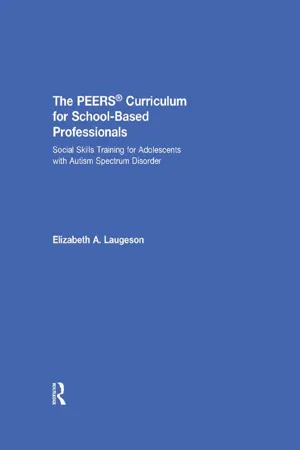
The PEERS Curriculum for School-Based Professionals
Social Skills Training for Adolescents with Autism Spectrum Disorder
- 312 pages
- English
- ePUB (mobile friendly)
- Available on iOS & Android
The PEERS Curriculum for School-Based Professionals
Social Skills Training for Adolescents with Autism Spectrum Disorder
About this book
The PEERS® Curriculum for School-Based Professionals brings UCLA's highly acclaimed and widely popular PEERS program into the school setting. This sixteen-week program, clinically proven to significantly improve social skills and social interactions among teens with autism spectrum disorder, is now customized for the needs of psychologists, counselors, speech pathologists, administrators, and teachers. The manual is broken down into clearly divided lesson plans, each of which have concrete rules and steps, corresponding homework assignments, plans for review, and unique, fun activities to ensure that teens are comfortable incorporating what they've learned. The curriculum also includes parent handouts, tips for preparing for each lesson, strategies for overcoming potential pitfalls, and the research underlying this transformative program.
Frequently asked questions
- Essential is ideal for learners and professionals who enjoy exploring a wide range of subjects. Access the Essential Library with 800,000+ trusted titles and best-sellers across business, personal growth, and the humanities. Includes unlimited reading time and Standard Read Aloud voice.
- Complete: Perfect for advanced learners and researchers needing full, unrestricted access. Unlock 1.4M+ books across hundreds of subjects, including academic and specialized titles. The Complete Plan also includes advanced features like Premium Read Aloud and Research Assistant.
Please note we cannot support devices running on iOS 13 and Android 7 or earlier. Learn more about using the app.
Information
WEEK 1INTRODUCTION AND TRADING INFORMATION |
Preparing for the Lesson
Table of contents
- Cover
- Half Title
- Title Page
- Copyright Page
- Dedication
- Table of Contents
- List of Tables
- About the Author
- Preface
- Acknowledgements
- Getting Started
- Week 1: Introduction and Trading Information
- Week 2: Two-Way Conversations
- Week 3: Electronic Communication
- Week 4: Choosing Appropriate Friends
- Week 5: Appropriate Use of Humor
- Week 6: Starting and Joining Conversations
- Week 7: Exiting Conversations
- Week 8: Good Sportsmanship
- Week 9: Get-Togethers
- Week 10: Handling Arguments
- Week 11: Changing Reputations
- Week 12: Handling Teasing and Embarrassing Feedback
- Week 13: Handling Physical Bullying
- Week 14: Handling Cyber Bullying
- Week 15: Minimizing Rumors and Gossip
- Week 16: Final Review, Post-Test Assessment, and Graduation
- Appendix A Test of Adolescent Social Skills Knowledge (TASSK)
- Appendix B Quality of Socialization Questionnaire–Adolescent (QSQ-A) Quality of Socialization Questionnaire–Parent (QSQ-P)
- Appendix C Phone Roster
- Appendix D In-Class Call Assignment Log
- Appendix E Daily Point Log
- Appendix F Good Sportsmanship Point Log
- Appendix G Homework Compliance Sheet
- Appendix H Sample Certifi cate of Completion
- Bibliography
- Index